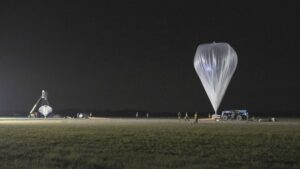The flights are scheduled to begin no earlier than 2024 from the Space Coast Air and Spaceport, also known as Space Coast Regional Airport in Titusville, Florida, near the Kennedy Space Center.
Spaceship Neptune will be able to carry eight people on flights lasting six hours, offering views like those from space but without the accelerations or microgravity of spaceflight. Depending on prevailing winds, the balloons will drift east over the Atlantic, or west across the Florida peninsula to the Gulf of Mexico, before descending and splashing down.
The company’s announcement came days after performing a test flight of the balloon system from the Florida spaceport. The June 18 flight took the balloon, carrying a full-size, but not full-weight, mockup of the capsule, to an altitude of 33 kilometers. The six-and-a-half-hour flight ended with a splashdown in the Gulf of Mexico 80 kilometers off the Florida coast.
“The test flight is really to get a sense of the conops,” or concept of operations, of the balloon flight, said Taber MacCallum, co-founder and co-chief executive of Space Perspective, in an interview. “We expect to learn a lot as we go through these early tests, and then take all of that information and go into the design cycle.”
Assuming the analysis of data from the test flight doesn’t turn up anything unexpected, he said he expected the company to spend the next 9 to 12 months working on a more detailed design of Neptune before performing a next round of test flights with a higher-fidelity prototype.
Although Space Perspective just officially started ticket sales, collecting an initial refundable deposit of $1,000, the company has been privately selling tickets for a few months. The company started with people who had signed up online to have the first chance to buy seats, said Jane Poynter, co-founder and co-chief executive.
“We’ve been getting an incredible response,” she said. She declined to say how many customers Space Perspective had signed up but cited as one example signing up 25 customers within an hour after one online event. The total number of customers “is a lot more than 25.”
Space Perspective foresees fitting into a spectrum of space tourism experiences that range from parabolic aircraft flights by Zero-G Corporation, offering brief periods of weightlessness for $6,700 each, to orbital flights by Axiom Space on SpaceX’s Crew Dragon estimated to cost $55 million per person. Space Perspective’s flights will likely cost a fraction of suborbital flights by Blue Origin and Virgin Galactic; neither company is currently selling tickets although Virgin Galactic previously sold SpaceShipTwo tickets for $250,000.
“We have people who have already bought Virgin tickets. They want to do this because they are so different,” she said. “There are whole families, whole groups of friends, who are far more comfortable with the idea of flying on this vehicle.”
“All the work that SpaceX is doing, and Blue and Virgin, is really great for us” by keeping space tourism in the headlines, MacCallum said. “The whole investor community feels much more confident in this now than they were even three or four years ago.”
Space Perspective raised $7 million in a seed round in December 2020. Poynter said the company’s next round could come as soon as late this year to fund continued development of Neptune, with strong interest from potential investors.
“When you look at what’s happening in the space industry writ large, and then the incredible excitement there is around space travel and space tourism now, it’s definitely in the zeitgeist,” she said.



